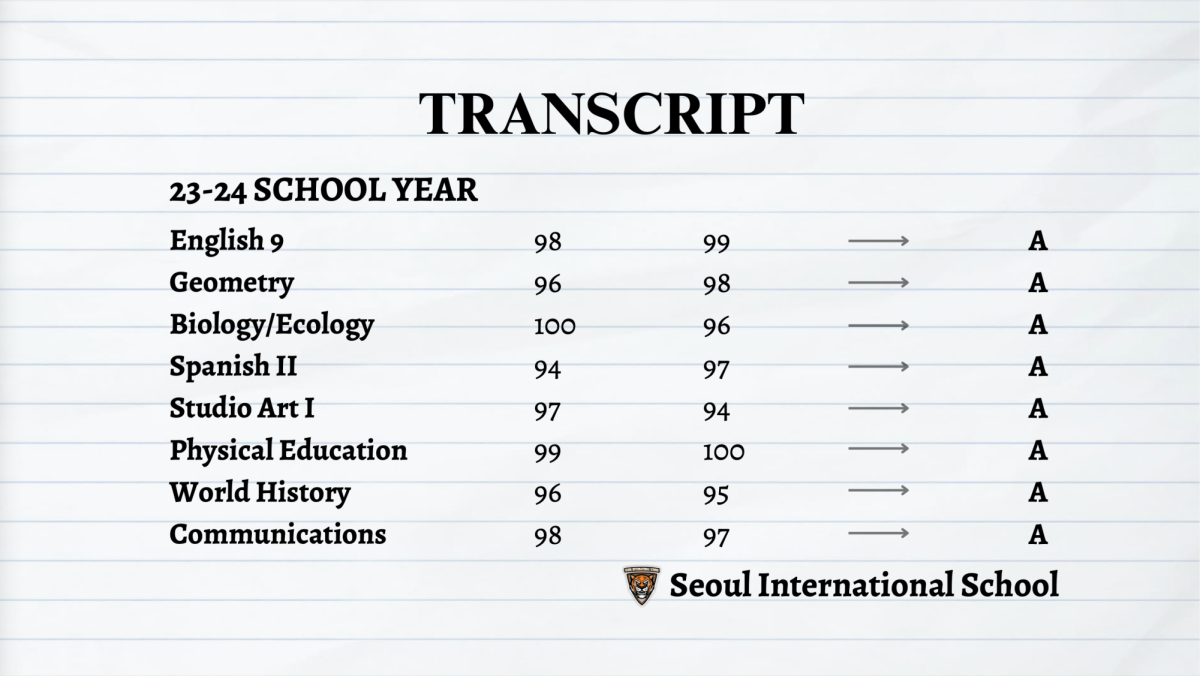Whether one is a freshman newly entering the realm of high school grades or a senior gathering transcripts for college applications, most SIS students would agree that grades play a vital role in college decisions and job prospects in the future. For this reason, students are often found spending their activity period in the library or staying up until the early hours of the morning to finish their homework for better grades. But at a certain point, are satisfactory grades coming at a cost that is simply too high? What would allow high schoolers to enjoy other aspects of their life, such as social events or family gatherings, rather than burning out over a series of numbers? A change to a letter grading system might allow students to improve their mental health.
“80 percent of the class is squeezed between a 95 and 100 GPA,” Kelcey Edwards, college counselor, said. “I wish our students had a healthier, more realistic understanding of what does and does not matter with regard to grades. There’s no difference in the likelihood of success in college if a student has a 95 or a 99.”
The implementation of letter grades would mean that any grade between 94 and 100 would simply be an “A.” If 80 percent of SIS students are grouped under the same letter, competition and stress over a single percent would vanish. Theoretically, students would feel less pressured to stay up late before a test or experience mood swings over their average rising up or falling down a trivial amount.
“I usually sleep at 2-3 a.m. or even later when there are exams to study for,” Jenny Park (10) said. “If the letter grade system is implemented, I will be less pressured to sleep later and memorize every possible detail. Although peer pressure can be a motivating factor, I tend to lose self-confidence when comparing myself with those around me. I believe that letter grades can lower stress because they give us a general idea of whether we are doing well without having to worry about the minute percent differences.”
Over the years as a high school student, the hours of stress and sleep lost will add up. Seniors may look back and wish that they had not spent much of their time worrying about little things and instead on their passions.
“Many SIS students, myself included, stress over losing any points on tests, perceiving even minor deductions as indicative of underperformance,” Steven Kim (12) said. “With letter grades requiring scores above 94, my focus would shift from perfect test scores to my mental health, extracurriculars, and pursuing my passions. The competition among students at SIS is intense, with everyone battling over the smallest decimal points. I believe that if the grading system were to transition to letter grades, I could get more rest.”
Though some students agree that letter grades would lead to reduced stress, it would also retire precise feedback for students as specific areas for improvement would not be reflected within such a large range for each letter. Furthermore, competitiveness and anxiety over grades are inevitable in an environment such as SIS. Letter grades would also foster an urgent need to implement grade deflation to ensure that 80 percent of students do not have the same grade.
“When I came to SIS in 2006, we had ABCDF so if you had a 93.4, you had a B and if you had a 93.5, you had an ‘A,’” Gray Macklin, High School Principal, said. “It buried big differences between students. If a 93 and 83 are not the same, that should be reflected. While that could theoretically help someone’s mental health, it did not.”
Previous experience with the letter grading system illustrates the downsides. The problems that led the school to switch from the letter system to the number system years ago show that a perfect grading system is simply nonexistent.
“Regardless of what grading system a school has in place, our students will always aim to maximize the outcome,” Ms. Edwards said. “That’s the nature of SIS, for better or for worse.”
According to responses from students and staff, letter grades would boost mental health, but would not diminish pressure completely. Grades and assignments are bound to bring stress regardless of the system implemented. Thus, letter grades would likely improve the sleep schedules of many students and reduce competition to a certain extent, but would still garner stress and prevent specific feedback from being communicated to students.



Mr. Warkentin | Dec 5, 2023 at 3:34 pm
The more important thing to realize is that, anytime students at this school get a bit of relief from one particular pressure, they fill the gap with a different pressure. In this case, does anyone really believe that students, their parents, and their consultants would say “Well, this student doesn’t need to study for Precalculus anymore, I guess we can just let her have that as free time!”
No. That extra time would be filled with high-intensity competitions, performances, and other external demands, all of which will be at least as stressful as trying to study for a perfect test score.
If students wish to diminish (even by a small amount) the pressure, the answer isn’t someone else giving them a free pass. The answer is – and has always been – students advocating for themselves, firmly telling other stakeholders in their lives that they need space. Stop waiting for your teachers or other adults to make your problems disappear. Find your own balance, stick to it, and don’t get pushed into an untenable situation.